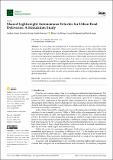Shared Lightweight Autonomous Vehicles for Urban Food Deliveries: A Simulation Study
Author(s)
Genua Cerviño, Ainhoa; Coretti Sanchez, Naroa; Wang, Elaine Liu; Grignard, Arnaud; Larson, Kent
Downloadfuturetransp-04-00030.pdf (19.05Mb)
Publisher with Creative Commons License
Publisher with Creative Commons License
Creative Commons Attribution
Terms of use
Metadata
Show full item recordAbstract
In recent years, the rapid growth of on-demand delivery services, especially in food deliveries, has spurred the exploration of innovative mobility solutions. In this context, lightweight autonomous vehicles have emerged as a potential alternative. However, their fleet-level behavior remains largely unexplored. To address this gap, we have developed an agent-based model and an environmental impact study assessing the fleet performance of lightweight autonomous food delivery vehicles. This model explores critical factors such as fleet sizing, service level, operational strategies, and environmental impacts. We have applied this model to a case study in Cambridge, MA, USA, where results indicate that there could be significant environmental benefits in replacing traditional car-based deliveries with shared lightweight autonomous vehicle fleets. Lastly, we introduce an interactive platform that offers a user-friendly means of comprehending the model’s performance and potential trade-offs, which can help inform decision-makers in the evolving landscape of food delivery innovation.
Date issued
2024-06-11Department
Massachusetts Institute of Technology. Media LaboratoryJournal
Future Transportation
Publisher
MDPI AG
Citation
Genua Cerviño, A.; Coretti Sanchez, N.; Wang, E.L.; Grignard, A.; Larson, K. Shared Lightweight Autonomous Vehicles for Urban Food Deliveries: A Simulation Study. Future Transp. 2024, 4, 634-658.
Version: Final published version
ISSN
2673-7590